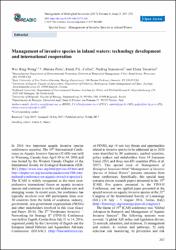Tackling invasive alien species in Europe II: threats and opportunities until 2020

View/
Date
2017Author
Piria, MarinaCopp, Gordon H.
Dick, Jaimie T. A.
Duplic, Aljosa
Groom, Quentin
Jelic, Dusan
Caffrey, Joe M.
Tarkan, Ali Serhan
Metadata
Show full item recordAbstract
Invasive alien species (IAS) are a significant and growing problem worldwide. In Europe, some aspects of IAS have been addressed through existing legal instruments, but these are far from sufficient to tackle the problem comprehensively. The FINS II Conference considered the relevance of Top 20 IAS issues (Top 10 threats and opportunities) for Europe determined at the 1st Freshwater Invasiveness-Networking for Strategy (FINS I) conference held in Ireland in 2013. Using a similar format of sequential group voting, threats from FINS I (lack of funding, of awareness and education; poor communication) and several new threats (lack of lead agencies, of standardized management and of common approach; insufficient monitoring and management on private property) were identified by 80 academics, applied scientists, policy makers and stakeholders from 14 EU and three non-EU countries (including 10 invited speakers) during four workshop break-out sessions (legislation remit in both EU/non-EU countries; best management and biosecurity practice for control; data management and early warning; pathways of introductions and citizen science). Identified opportunities include improved cooperation and communication, education and leadership to enhance public awareness and stakeholder participation, systems establishment for early detection, rapid response, monitoring and management of IAS using standardised methods of data collection, storage and usage. The sets of threats and opportunities identified underline the importance of international cooperation on IAS issues in communication, education and funding as priorities, as well as in standardization of legislation, control methods and best practise of research.

















